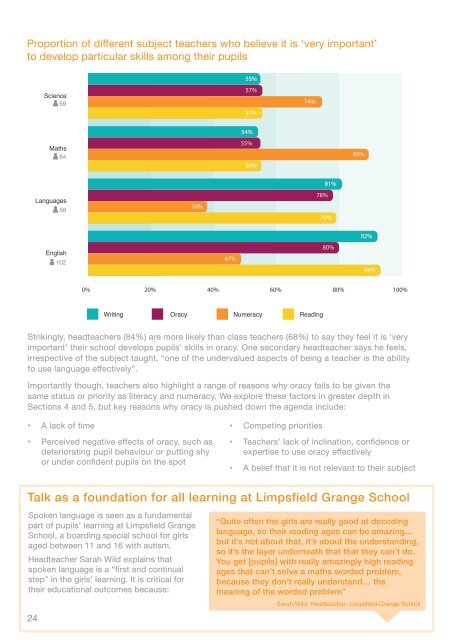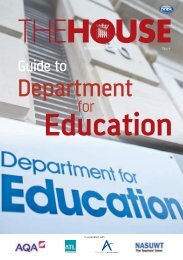Oracy
2fcBkno
2fcBkno
You also want an ePaper? Increase the reach of your titles
YUMPU automatically turns print PDFs into web optimized ePapers that Google loves.
Proportion of different subject teachers who believe it is ‘very important’<br />
to develop particular skills among their pupils<br />
Science<br />
69<br />
55%<br />
57%<br />
57%<br />
74%<br />
Maths<br />
84<br />
54%<br />
55%<br />
56%<br />
89%<br />
Languages<br />
58<br />
38%<br />
81%<br />
78%<br />
79%<br />
92%<br />
English<br />
102<br />
47%<br />
80%<br />
94%<br />
0% 20%<br />
40% 60%<br />
80% 100%<br />
Writing <strong>Oracy</strong> Numeracy Reading<br />
Strikingly, headteachers (84%) are more likely than class teachers (68%) to say they feel it is ‘very<br />
important’ their school develops pupils’ skills in oracy. One secondary headteacher says he feels,<br />
irrespective of the subject taught, “one of the undervalued aspects of being a teacher is the ability<br />
to use language effectively”.<br />
Importantly though, teachers also highlight a range of reasons why oracy fails to be given the<br />
same status or priority as literacy and numeracy. We explore these factors in greater depth in<br />
Sections 4 and 5, but key reasons why oracy is pushed down the agenda include:<br />
• A lack of time<br />
• Perceived negative effects of oracy, such as<br />
deteriorating pupil behaviour or putting shy<br />
or under confident pupils on the spot<br />
• Competing priorities<br />
• Teachers’ lack of inclination, confidence or<br />
expertise to use oracy effectively<br />
• A belief that it is not relevant to their subject<br />
Talk as a foundation for all learning at Limpsfield Grange School<br />
Spoken language is seen as a fundamental<br />
part of pupils’ learning at Limpsfield Grange<br />
School, a boarding special school for girls<br />
aged between 11 and 16 with autism.<br />
Headteacher Sarah Wild explains that<br />
spoken language is a “first and continual<br />
step” in the girls’ learning. It is critical for<br />
their educational outcomes because:<br />
24<br />
“Quite often the girls are really good at decoding<br />
language, so their reading ages can be amazing…<br />
but it’s not about that, it’s about the understanding,<br />
so it’s the layer underneath that that they can’t do.<br />
You get [pupils] with really amazingly high reading<br />
ages that can’t solve a maths worded problem,<br />
because they don’t really understand… the<br />
meaning of the worded problem”<br />
Sarah Wild, Headteacher, Limpsfield Grange School




